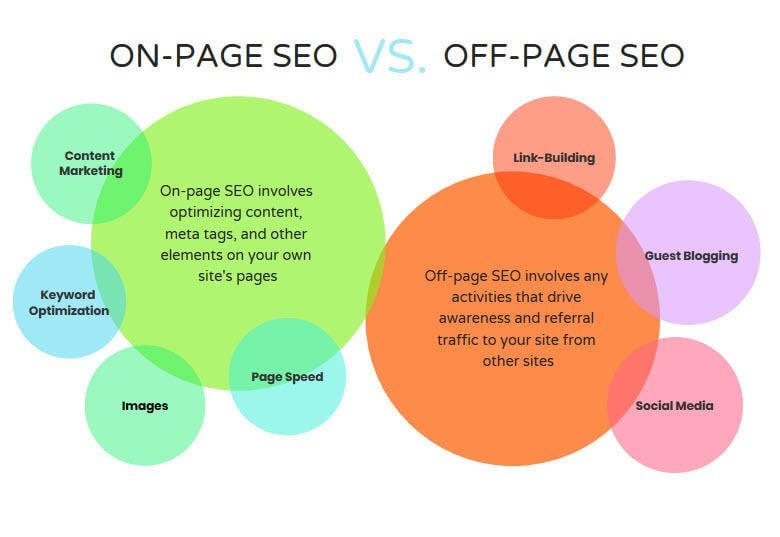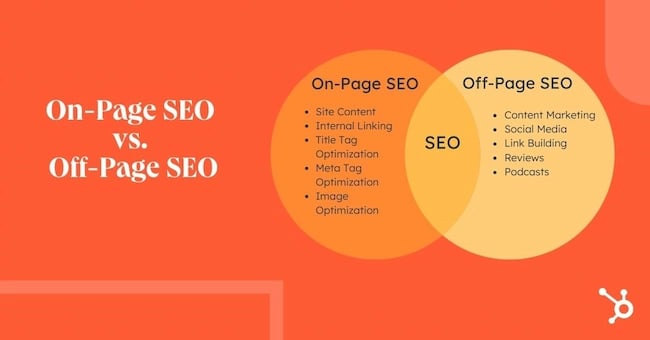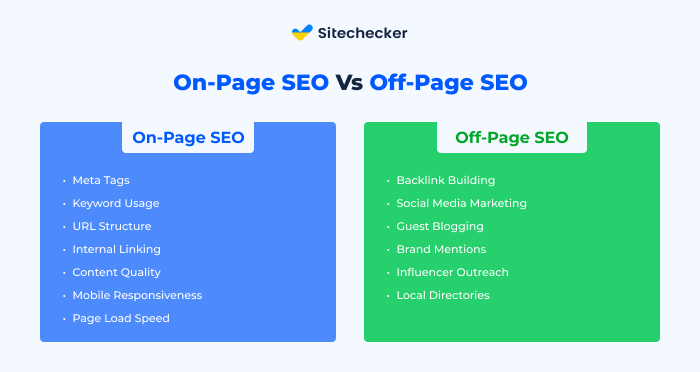Uncover the secrets of effective SEO strategies with a detailed analysis of On-Page vs Off-Page techniques – essential reading!

Image courtesy of via DALL-E 3
Table of Contents
Welcome to the world of SEO! SEO stands for Search Engine Optimization. It’s like a secret code that helps websites show up higher on search engines like Google when you look for something. Understanding SEO is super important for websites because it helps them attract more visitors. In this article, we’ll explore two key types of SEO: On-Page SEO and Off-Page SEO. Let’s dive in to see how they work and compare!
What is SEO?
SEO, or Search Engine Optimization, is a cool way for websites to tell search engines that they have awesome stuff to show. By using specific words, called keywords, and other tricks, websites can climb higher in search results when you look for something online. It’s like a treasure map for websites to get discovered!
The Importance of SEO
SEO is like a magic wand for websites, making them more visible to people surfing the web. By using SEO, websites can attract more visitors and grow their online presence. It’s like having a big sign that says, “Hey, come check out this awesome website!”
Introduction to On-Page and Off-Page SEO
Now, let’s talk about two special kinds of SEO: On-Page SEO and Off-Page SEO. On-Page SEO focuses on things inside the website itself, like the words on a page or the special tags used in the website’s code. Off-Page SEO, on the other hand, looks at things like how many other websites talk about yours or how popular your website is on social media. Together, they work like a dynamic duo to boost a website’s visibility online.
Understanding On-Page SEO
In the world of websites and search engines, On-Page SEO plays a crucial role in helping a web page rank higher in search results. But what exactly is On-Page SEO?
What is On-Page SEO?
On-Page SEO refers to the optimization of elements within a website itself to improve its search engine ranking. This includes factors like keyword usage, meta descriptions, and the use of HTML tags.
Key Elements of On-Page SEO
Several key elements make up On-Page SEO. One of the most important is the use of relevant keywords in website content. These keywords tell search engines what your page is about and help it show up in relevant searches. Additionally, meta descriptions – the brief summaries that appear below the page title in search results – play a role in attracting users to click on your page.
HTML tags are another essential component of On-Page SEO. These tags, like title tags, header tags, and meta tags, provide information about your content to search engines, making it easier for them to understand and rank your page.
Optimizing Content
One effective way to boost On-Page SEO is by optimizing your content with relevant keywords. By strategically placing keywords throughout your content, you can improve your chances of ranking higher in search results. However, it’s important to use keywords naturally and not to overstuff them into your content.
Using HTML Tags
HTML tags play a crucial role in On-Page SEO. Title tags, for example, not only give users an idea of what your page is about but also help search engines understand the content of your page. Similarly, header tags like H1 and H2 can structure your content and make it more readable for both users and search engines.
Importance of Internal Links
Internal links, or links that connect pages within the same website, are another important aspect of On-Page SEO. By linking related pages together, you can help users navigate your site more easily and show search engines the relationships between different pieces of content on your website.
Understanding Off-Page SEO
Off-Page SEO refers to all the external factors that influence your website’s search engine rankings. Unlike On-Page SEO which focuses on optimizing elements within your website, Off-Page SEO deals with factors outside of your website’s boundaries. These external factors play a significant role in determining how authoritative and trustworthy your site is perceived by search engines like Google.
Importance of Backlinks
One of the key elements of Off-Page SEO is the concept of backlinks. Backlinks are links from other websites that lead back to your site. They act as a vote of confidence in the eyes of search engines, indicating that other sites trust your content. The more high-quality backlinks you have from reputable websites, the more credibility and authority your site gains, ultimately leading to higher search engine rankings.
Social Media Impact
Social media has become a powerful tool in the realm of Off-Page SEO. By leveraging platforms like Facebook, Twitter, Instagram, and LinkedIn, you can share your website content with a broader audience. When your content gets shared, liked, and commented on across social media channels, it signals to search engines that your site is popular and engaging. This social proof can positively impact your search engine rankings.
Guest Blogging
Guest blogging involves writing articles for other websites within your industry or niche. By contributing valuable content to reputable sites, you can not only showcase your expertise but also earn backlinks to your own website. Guest blogging helps you reach a new audience, drive traffic to your site, and improve your authority in the eyes of search engines – all of which are beneficial for Off-Page SEO.
Building Online Reputation
Your online reputation plays a crucial role in Off-Page SEO. Maintaining a positive image through online reviews, mentions, and testimonials can boost your credibility and trustworthiness. When other websites and users speak highly of your brand, it adds value to your site in the eyes of search engines. Building a strong online reputation can enhance your Off-Page SEO efforts and help improve your search engine rankings.
Comparing On-Page and Off-Page SEO
When it comes to optimizing a website for search engines, there are two main strategies that can be employed: On-Page SEO and Off-Page SEO. These two approaches play a crucial role in helping websites rank higher in search engine results pages. Let’s delve into the differences between On-Page and Off-Page SEO to understand their benefits and challenges.

Image courtesy of via Google Images
Benefits of On-Page SEO
On-Page SEO focuses on optimizing elements within a website to improve its search engine visibility. By utilizing relevant keywords, meta descriptions, and internal links, websites can enhance their chances of ranking well in search results. The primary advantage of On-Page SEO is that website owners have full control over the content and structure of their site, allowing them to directly influence their search engine rankings.
Challenges of On-Page SEO
One of the challenges of On-Page SEO is the constant need to update and optimize content to stay relevant and competitive. It can be time-consuming to research and implement the best keywords, meta descriptions, and other elements that search engines look for. Additionally, achieving a balance between optimizing for search engines and creating valuable content for readers can sometimes be tricky.
Benefits of Off-Page SEO
Off-Page SEO focuses on factors outside the website that can impact its search engine rankings. This includes building backlinks from reputable sources, engaging in social media marketing, guest blogging, and maintaining a positive online reputation. The main benefit of Off-Page SEO is that it helps establish the credibility and authority of a website, which can significantly improve its search engine rankings.
Challenges of Off-Page SEO
One of the challenges of Off-Page SEO is the time and effort required to build quality backlinks and establish a strong presence on social media platforms. It can be challenging to attract high-quality backlinks from reputable websites, and maintaining a positive online reputation requires ongoing effort and vigilance. Additionally, the impact of off-page factors on search engine rankings can sometimes be less predictable than on-page factors.
Best Practices for Both Types
While On-Page and Off-Page SEO have their unique benefits and challenges, it’s important to remember that they work best when used together. By combining both strategies and following best practices such as creating high-quality content, building backlinks from authoritative sources, and engaging with your target audience on social media, you can maximize your chances of achieving success in search engine rankings.
Strategies for Effective On-Page SEO
When it comes to On-Page SEO, one of the most crucial strategies is optimizing your website content. This involves strategically placing relevant keywords throughout your content to help search engines understand what your page is about. Make sure to include keywords in headings, meta descriptions, and alt text for images. By creating high-quality, informative content that incorporates these keywords naturally, you can boost your website’s visibility in search engine results.
Improving Technical SEO
Another essential aspect of On-Page SEO is focusing on the technical elements of your website. Ensure your website is technically optimized for search engines by improving factors such as website speed, mobile-friendliness, and site structure. Search engines favor websites that load quickly and provide a seamless user experience, so investing in technical SEO can significantly impact your website’s search rankings.
Enhancing User Experience
Enhancing the user experience on your website is not only important for attracting and retaining visitors but also for improving your On-Page SEO. Search engines prioritize websites that offer a positive user experience, so make sure your site is easy to navigate, visually appealing, and provides valuable content. By focusing on improving user experience, you can increase the time users spend on your site and reduce bounce rates, signaling to search engines that your website is a valuable resource for users.
Strategies for Effective Off-Page SEO
Off-Page SEO is all about activities that happen outside of your website to improve its visibility and ranking on search engines. Here are some essential strategies to enhance your Off-Page SEO and boost your online presence:

Image courtesy of via Google Images
Building Quality Backlinks
One of the most crucial aspects of Off-Page SEO is building high-quality backlinks from reputable websites. Backlinks act as ‘upvotes’ for your site in the eyes of search engines, indicating that your content is valuable and worth sharing.
Using Social Media
Social media platforms play a significant role in Off-Page SEO by increasing brand awareness, driving traffic to your site, and generating engagement. Share your content on social media channels and encourage users to interact with it by liking, sharing, and commenting.
Influencer Outreach
Collaborating with influencers in your niche can amplify your Off-Page SEO efforts. Influencers have a loyal following who trust their recommendations, so having them endorse your brand or content can result in increased visibility and credibility.
Measuring SEO Success
In the world of SEO, it’s essential to know how to measure the success of your efforts. You can put in a lot of work optimizing your website, but if you don’t track your progress, you won’t know if you’re moving in the right direction. So, let’s dive into some key metrics and tools you can use to measure the success of your SEO endeavors.
Important SEO Metrics
When it comes to measuring SEO success, there are several key metrics you should pay attention to. First and foremost, website traffic is a crucial indicator of how well your SEO is performing. An increase in organic traffic means that more people are finding your website through search engines, which is a good sign.
Search rankings are another vital metric to monitor. Keeping track of where your website ranks for important keywords can give you insight into whether your SEO efforts are paying off. The higher your rankings, the more visible your website will be to potential visitors.
Conversion rates are also essential metrics to consider. Ultimately, the goal of SEO is to drive more conversions, whether that’s sales, sign-ups, or any other desired action on your website. By tracking your conversion rates, you can see if your SEO strategies are leading to the desired outcomes.
Tools for Measuring Success
Fortunately, there are plenty of tools available to help you measure the success of your SEO efforts. One of the most popular tools is Google Analytics, which provides a wealth of data about your website’s performance. You can see where your traffic is coming from, which pages are most popular, and how visitors are interacting with your site.
Other tools like SEMrush, Ahrefs, and Moz can also provide valuable insights into your SEO performance. These tools can help you track keyword rankings, analyze backlinks, and identify areas for improvement on your website.
By using these tools to regularly monitor your website’s performance, you can gain a deeper understanding of how your SEO strategies are working and make informed decisions about where to focus your efforts.
Adjusting Strategies
Measuring SEO success isn’t just about looking at the numbers—it’s also about using that data to inform your future strategies. If you notice that certain tactics are leading to positive results, you may want to double down on those efforts. On the other hand, if you see that certain strategies aren’t producing the desired outcomes, it may be time to pivot and try something new.
SEO is an ongoing process, and it’s essential to continually evaluate and adjust your strategies based on the metrics you’re tracking. By staying flexible and responsive to the data, you can ensure that your SEO efforts are consistently moving your website in the right direction.
Conclusion
In this article, we explored the world of SEO (Search Engine Optimization) and the two main types: On-Page SEO and Off-Page SEO. On-Page SEO focuses on optimizing elements within a website, such as content, HTML tags, keywords, meta descriptions, and internal links. By strategically using these elements, websites can improve their visibility and ranking on search engines like Google.

Image courtesy of via Google Images
Summary of Off-Page SEO
On the other hand, Off-Page SEO deals with factors outside the website’s realm, such as backlinks, social media presence, guest blogging, and online reputation. These external elements play a crucial role in establishing a website’s authority and credibility in the digital landscape.
Final Thoughts
Both On-Page SEO and Off-Page SEO are indispensable components of a successful SEO strategy. While On-Page SEO focuses on optimizing the website itself, Off-Page SEO works to build a strong online presence and reputation. When combined effectively, these two approaches can elevate a website’s visibility, attracting more visitors and potentially increasing conversion rates.
FAQs
What is the primary difference between On-Page and Off-Page SEO?
On-Page SEO focuses on optimizing elements within your website, such as content and HTML tags, to improve your search engine rankings. In contrast, Off-Page SEO involves factors outside of your website, like backlinks and social media presence, that influence how search engines view your site.
Can I only use one type of SEO?
While you can technically focus on either On-Page or Off-Page SEO alone, using both in conjunction is the most effective strategy. Combining both types of SEO tactics maximizes your chances of ranking higher in search engine results.
How long does it take to see results?
The time it takes to see results from your SEO efforts can vary depending on various factors, such as the competitiveness of your industry and the quality of your SEO strategies. In general, noticeable improvements in rankings can take several weeks to months to manifest.
Is SEO a one-time task?
No, SEO is not a one-time task. Search engine algorithms frequently change, and competition for top rankings is ongoing. Regularly updating and optimizing your website for SEO is crucial to maintaining and improving your search engine rankings over time.







